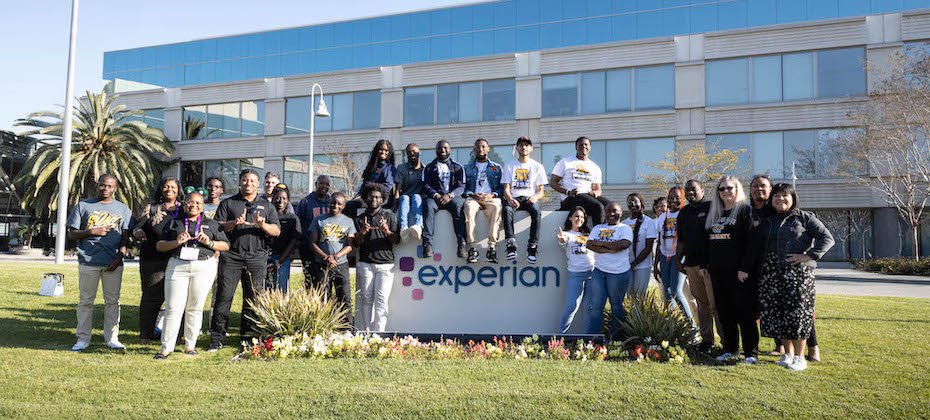Social Responsibility
Experian is deeply committed to making an important difference in each of the communities we operate and live all over the world. Through our relationships with nonprofit organizations, our dedication to consumer education and our encouragement of employee volunteerism, we are able to champion a number of important causes. Read about our latest corporate social responsibility news below:

In a world where financial stress affects the majority of adults, it’s easy to feel overwhelmed and isolated. The good news? You're not alone, and there's a way out. Why it matters: Our recent research sheds light on the prevalence of financial stress among U.S. adults. Nearly 70% of adults feel they have suffered or are currently suffering from financial trauma. This research highlights the urgent need for increased financial education and planning. In addition to job loss, financial fallout from the pandemic, or other economic challenges, a lack of discussion about money growing up and limited access to trustworthy information about finances may be two factors contributing to financial stress: More than half (51%) stated their family rarely or never spoke about finances. This lack of discussion left 43% of those who rarely or never spoke about finances growing up feeling like they never learned about financial planning and 42% stating they never learned to use credit or build their credit scores. 37% of adults are unaware of where to access trustworthy information about financial literacy. So, how can we alleviate financial stress? While reducing financial stress will take a multi-faceted approach and will, in many ways, depend on a consumer’s unique financial situation, our survey revealed a common theme: more education would help consumers feel better about their financial situation. A majority (55%) said access to more financial education would help alleviate their financial stressors. In addition, 45% believe establishing a more concrete financial plan for their future would reduce their financial anxieties. Experian’s free tools and resources Education is central to our mission and we are committed to connecting consumers with tools and financial resources to live more financially empowered lives. If you’re battling financial stress, seeking financial education or working on building a financial plan for your future, here are a few ways we can help: Experian Boost®: Consumers can add positive telecom, utility, video streaming service and qualifying rent payments to their Experian credit file for an opportunity to improve their credit scores by visiting experian.com/boost.[1] Experian Go: Consumers without an established credit history can download Experian’s mobile app and enroll in a free Experian membership to establish, use and build credit responsibly with Experian Go. Experian Smart Money: Earlier this month, Experian released the Experian Smart Money™ Digital Checking Account & Debit Card[2] that embeds Experian Boost. Now it is even more convenient for consumers to use Experian’s feature and improve their credit profile, while also benefiting from an industry-leading suite of financial tools all in one place. Experian’s official credit advice blog, Ask Experian, has answers to common questions, advice and education about credit. Consumers can find additional credit education resources at http://www.experian.com/consumereducation. Free credit monitoring and alerts: consumers can sign up for credit monitoring and receive a free copy of their Experian credit report and FICO Score®[1] monthly at experian.com or via Experian’s mobile app. Experian’s mobile app also offers access to personal finance and credit building tools such as: Industry collaboration is key The onus to overcome financial challenges and stress does not fall solely on consumers. As a financial services community, we have a responsibility to make financial education materials available to consumers. Each of us holds a different piece of the puzzle. For instance, we’ve long partnered with organizations dedicated to helping consumers navigate and overcome financial challenges, including the National Foundation for Credit Counseling (NFCC). The NFCC has personalized resources available to help consumers, including 1:1 credit counseling. Consumers can receive one-on-one support from one of over 1,200 certified financial counselors at 250 locations across the U.S. to establish debt relief plans through the NFCC by visiting: https://www.nfcc.org/ By fostering collaboration among various stakeholders, including nonprofits, community leaders, credit bureaus, and other financial institutions, consumers can gain a comprehensive understanding of the different components of the financial system. Additional key findings include: Methodology Experian commissioned Atomik Research to conduct an online survey of 2,001 adults throughout the United States. Researchers controlled for demographic variables such as gender, age, geographic region, race and ethnicity in order to achieve similar demographic characteristics reported in the U.S. census. The margin of error of the overall sample is +/-2 percentage points with a confidence level of 95 percent. Fieldwork took place between August 22 and August 28, 2023. Atomik Research is a creative market research agency. 1 Credit score is calculated based on FICO® Score 8 model, unless otherwise noted. In addition to the FICO® Score 8, we may offer and provide other base or industry-specific FICO® Scores (such as FICO® Auto Scores and FICO® Bankcard Scores). Your lender or insurer may use a different FICO® Score than FICO® Score 8 or such other base or industry-specific FICO® Score (if available), or another type of credit score altogether. Learn more. 2 Results will vary. Not all payments are boost-eligible. Some users may not receive an improved score or approval odds. Not all lenders use Experian credit files, and not all lenders use scores impacted by Experian Boost®. Learn more. 3 The Experian Smart Money Debit Card™ is issued by Community Federal Savings Bank (CFSB), pursuant to a license from Mastercard International. Banking services provided by CFSB, Member FDIC. Experian is a Program Manager, not a bank.

As people around the country prepare to celebrate Fourth of July, our newly released research shows many Gen Z and millennial consumers are longing for more financial independence from their parents. Why it matters: more than half of Gen Zers and millennials are still financially dependent on their parents. And many don’t feel good about it – with two-thirds saying they feel ashamed when asking their parents for financial support. For many, having an established credit history is key to feeling more financially independent. Additional survey highlights include: StatementGen Z(Ages 18-26)Millennials(Ages 27-42)TotalI am somewhat or very financially dependent on my parents61%47%54%I feel ashamed when I have to ask my parents for financial support62%70%66%I do not consider my parents to be good financial role models28%27%27%Having an established credit history is important to being less financially dependent on my parents77%84%80%I have a hard time saying no to myself when making impulse purchases58%56%57%I am considering cutting down on my online entertainment subscriptions to save money58%55%57%I prefer to spend money on life experiences (like traveling, concerts, etc.) now rather than saving for retirement63%59%61% In addition to limited experience with credit, Gen Z and millennial spending habits may be another factor causing them to rely on parents for financial support. More than half (57%) say they have a hard time saying no to themselves when making an impulse purchase for something they want but don’t need. This is a struggle I can relate to. It’s become easier than ever to purchase what I want, when I want it, right from my phone. When I catch myself doing this, I pause, and I ask myself if this purchase is a need or a want. That quick check-in really helps to curb my impulse spending. Credit can be a financial tool to help us achieve many of the things we want in life, including financial independence from our parents. We have resources available to help consumers lead more financially empowered lives. Our goal is to connect consumers with tools and education to help bring financial power to all. Experian’s free tools and resources If you’re looking to save money, build or improve your credit and be more financially independent, I encourage you to take advantage of Experian’s free tools and resources, including: Reading Experian’s savings blog post with nationally-recognized consumer finance and budgeting expert Andrea Woroch about how to keep more money in your pocket Watching the “In My Bag” Financial Health Video Series featuring actress-singer Coco Jones for savings tipsJoining Experian’s #CreditChat hosted by @Experian on Twitter with financial experts every Wednesday at 3 p.m. Eastern timeSigning up for Experian Boost™[v], a free feature that enables consumers to add positive payment histories for telecom, utility, video streaming services as well as rent directly to their Experian credit file for a chance to potentially improve their FICO® Score instantlyLearning how to build and protect your credit with Experian’s Credit Essentials for Everyone flipbook and find additional credit education resources at http://www.experian.com/consumereducation. Find additional money-saving resources from Experian by visiting Experian.com/savings Survey methodology Experian commissioned Atomik Research to conduct an online survey of 2,008 adults between the ages of 18-42 years old throughout the United States, with even distribution between Generation Z (N=1,005) and millennials (N=1,003) participants. The margin of error is +/- 2 percentage points with a confidence level of 95 percent. Fieldwork took place between March 31, 2023, and April 4, 2023. Atomik Research is an independent, creative market research agency. [v] Results will vary. Not all payments are boost-eligible. Some users may not receive an improved score or approval odds. Not all lenders use Experian credit files, and not all lenders use scores impacted by Experian Boost®. Learn more.

Our latest State of the Automotive Finance Report: Q1 2023 showed the average new vehicle loan amount reached $40,851, and today’s average used vehicle loan amount is $26,420. While the growth of average loan amounts is slowing, and in some cases, decreasing from previous years, rising interest rates are pushing monthly payments higher for many consumers. This news comes at a time when many consumers are looking for ways to save money and are holding onto their vehicles longer. In fact, as of Q1 2023, the average length of ownership for new vehicles purchased as far back as 2010 is 4.19 years. At the same time, the cost of vehicle repairs has many consumers feeling financially stressed. Whether to eliminate the burden of rising costs of goods and services, or to plan for big ticket items like vehicle purchases or repairs, our research shows saving money is top of mind for many consumers. Two-thirds tell us they are actively looking for ways to trim expenses from their monthly budget. If you’re shopping for a new set of wheels, or trying to keep your old ones on the road longer, here are four steps you can take to save money: Use credit as a financial tool A good credit score could help you qualify for better interest rates and better terms for loans. Whether you’re looking to purchase a new vehicle or finance repairs, a positive credit history can be a powerful financial tool. Your credit score can also impact the rates you may pay for insurance. Work to keep your credit card balances low and make your payments on time. Using tools like Experian Boost[1] allows you to add your positive payments for telecom and utility bills as well as video streaming services - and now rent payments – to your Experian credit file to potentially increase your FICO®[2] Score instantly. Cut costs where you can We are committed to helping consumers save money in multiple ways and auto insurance is one area consumers may be overpaying. To combat this, we now offer an auto insurance shopping service that delivers tailored rates based on your current policy and vehicle directly from our mobile app. Consumers can potentially save on average more than $900 per year through our service, which is significant. Plan ahead to save on interest rates Interest rates are a key consideration if you’re shopping for a new or used vehicle. Our latest State of the Automotive Finance Market Report showed the average interest rate for a new vehicle is 6.58%. Oftentimes when shopping for a vehicle the main priority is securing a low monthly payment, but it’s also important to assess the total cost of the loan, particularly amid rising interest rates and vehicle prices. With this in mind, some new vehicle shoppers who were in search of lower interest rates opted for shorter loan terms in Q1 2023. Determine how much you can afford to spend each month and opt for shorter loan terms to save on interest. Don’t get a lemon With prices increasing, we know many people are opting for used vehicles. While this can help with costs, it’s important to know what you’re buying before you sign on the dotted line. Request a vehicle history report, like an Experian AutoCheck report, before committing to the purchase. These reports include how many previous owners the vehicle had, or if there were any reported accidents. This can help you avoid surprises down the road and give you a better idea of the value of the car. In addition to a vehicle history report, we recommend having the vehicle inspected by a licensed mechanic. We rely on our vehicles every day. By leveraging the right tools, and with proper planning, you may view them less as a financial burden and more as a means to enjoy the freedom of the open road. [1] [Results will vary. Not all payments are boost-eligible. Some users may not receive an improved score or approval odds. Not all lenders use Experian credit files, and not all lenders use scores impacted by Experian Boost. Learn more. [2] FICO is a registered trademark of Fair Isaac Corporation

Understanding how credit works is key to protecting your financial health in any environment – and this is especially true today. What’s new: To see how America’s youngest consumers are faring, we recently deployed a national survey looking at: Gen Z and millennial’s understanding of credit and personal financeHow recent economic news is impacting their financial health What would make them feel more optimistic about their situation Why it matters: As we look ahead, millennials and Gen Z consumers will be the biggest drivers of spending and our economy. Ensuring they have access to trusted financial education and resources is key. Survey highlights include: Building a strong credit history is key to unlocking many things we want in life, yet many younger people do not understand its importance until they get older. The bottom line: Our research revealed many Gen Z and millennial consumers are simply unsure how to successfully build credit and are hungry for trusted resources of personal finance information. “We believe in financial power for all and ensuring America’s youngest consumers are empowered to be financially independent adults is key to achieving this,” said Christina Roman, consumer education advocate at Experian. “Personal finance and credit education are central to our mission. We are committed to being a trusted resource for consumers looking to improve their financial health during our current economic environment and beyond.” How Experian Can HelpThere are free and easy steps consumers can take to help improve their financial health with Experian, including: Getting a free copy of your Experian credit report and FICO[1] Score®[2] at www.experian.com or via Experian’s mobile app. Our app also has free personal finance and credit building tools Add positive telecom, utility, video streaming service and qualifying rent payments to your Experian credit report through Experian Boost[3] for an opportunity to improve your credit scores by visiting www.experian.com/boost. Young consumers without an established credit history can download Experian’s mobile app and enroll in a free Experian membership to establish, use and grow credit responsibly with Experian Go™ Joining Experian’s #CreditChat hosted by @Experian on Twitter with financial experts every Wednesday at 3 p.m. Eastern timeVisiting the Ask Experian blog for answers to common questions, advice and education about creditLearn how to build and protect your credit with Experian’s Credit Essentials for Everyone flipbook and find additional credit education resources at resources at http://www.experian.com/consumereducation. Find additional money-saving resources from Experian by visiting experian.com/savings Survey MethodologyExperian commissioned Atomik Research to conduct an online survey of 2,008 adults between the ages of 18-42 years old throughout the United States, with even distribution between Generation Z (N=1,005) and millennials (N=1,003) participants. The margin of error is +/- 2 percentage points with a confidence level of 95 percent. Fieldwork took place between March 31, 2023, and April 4, 2023. Atomik Research is an independent, creative market research agency. [1] FICO is a registered trademark of Fair Isaac Corporation [2] Credit score calculated based on FICO Score 8 model. Your lender or insurer may use a different FICO® Score than FICO® Score 8, or another type of credit score altogether. Learn more. [3] Results will vary. Not all payments are boost-eligible. Some users may not receive an improved score or approval odds. Not all lenders use Experian credit files, and not all lenders use scores impacted by Experian Boost. Learn more.

I don’t know about you, but the importance of a good credit score wasn’t something talked about around my family’s dining room table growing up. I knew the value of a dollar and the importance of saving and budgeting, but I didn’t realize how many things I’d want in life would depend on having an established credit history. It wasn’t until I went buy my first car that I realized just how important credit can be. I had been using credit, but I wasn’t using it as a tool that could work for me. In fact, in this instance, my credit score was working against me. Thankfully, my boyfriend at the time (and now husband), co-signed on my auto loan so I could get a better interest rate. This experience served as the wakeup call I needed to prioritize improving my credit and overall financial health. I know my story is similar to many others. In fact, our recent research shows 77% of millennials and Gen Z consumers are striving to be more financially literate and nearly 80% are actively trying to increase their credit scores. Just as I was, these consumers are hungry for knowledge and 69% are actively seeking trusted resources for personal finance information. I’m thankful to work for a company that puts consumers at the heart of everything we do. Education is central to our mission and my job is to educate consumers about the tools and resources we have available to help bring financial to all. Talk about coming full circle! So, if you’re looking for ways to improve your financial health, here are a few quick tips: Get engaged: Many people think checking their credit report will hurt their credit scores, but this is not true. This is one of the most common myths about credit reports. You can, and should, check your credit report regularly. This is one of the best ways to understand where you stand from a credit perspective. You can get a free Experian credit report and FICO® Score once a month through our mobile app. You can also get a free credit report from each of the three credit reporting agencies by visiting AnnualCreditReport.com. Usethe tools available to you: There are a lot of helpful tools availabletoday that weren’t even just a few years ago, including Experian Boostand Experian Go. Experian Go makes it easyfor people with a limited or nonexistent credit history to establish, use andgrow credit responsibly. And with Experian Boost, you can self-report your cellphone, utility, telecom, and video streaming service payments directly to yourExperian credit report for an opportunity to instantly improve your creditscore. Seektrusted resources: In this age of information overload andsocial media, it can be hard to find trusted sources of personal finance information,but we’re here to help. You can find answers to common questions by joining ourweekly #CreditChats onTwitter or by visiting our Ask Experian blog.We also have free resources available at www.experian.com/consumerseducation. Avoidmaking mistakes with lasting financial impact: I know, I know. This canbe easier said than done, but it’s an important consideration to protect yourfinancial health. There are many times in life where it’s OK to learn by makingmistakes, but credit and personal finance are not a time you want to do that ifyou can avoid it. If you’re using credit, make sure you have a plan for payingthe debt you owe. Credit can be a financial tool, but debt is a financialproblem. Make sure you understand your needs vs. your wants and try to keep yourbalances as low as possible. As the saying goes, knowledge truly is power. I know this to be true from experience and our research shows a better understanding of personal finance would make 75% of Gen Z and millennials feel more optimistic about their situation. This is good news as there are many easy steps consumers can take today to feel more educated and empowered. Getting engaged with your credit report and finding the right tools and resources are some of the best ways to protect your financial health in our current environment and beyond.

We’re very proud to have been awarded a top 75 score in the third edition of Europe’s Climate Leaders, which is compiled by The Financial Times in partnership with Statista, in recognition of our success in reducing our carbon emissions and our commitment to tackling climate change. The awards provide each company listed with a score based on their performance in cutting, and reporting transparently on, greenhouse gas emissions, as well as collaboration with environmental reporting group CDP and the Science Based Targets initiative. Our score acknowledges Experian’s ongoing commitment to reducing our environmental footprint, as we work towards our target of becoming carbon neutral in our own operations by 2030. In 2022 we continued our reduction in Scope 1 and 2 emissions and achieved a 44% reduction since 2019, as we work towards our science-based target to achieve a 50% reduction by 2030. We’re also continuing to engage with our suppliers in order to reduce the level of our scope 3 emissions through the footprint of the products and services we buy. We want to further our ambition and we are currently developing our Net Zero Transition Plan, to decarbonise our operations even further.

Experian research shows more than a quarter of Black and Hispanic consumers are invisible to the credit market, compared to 16% of Asian and White consumers. This is a significant gap that all of us can improve. At our North American headquarters, a group of young scholars took the lead on finding solutions. Four teams representing Historically Black Colleges and Universities (HBCUs) visited our campus and shared their creativity and personal stories with us in the finale of the inaugural #IYKYK Hackathon. The Hackathon was the culmination of a six-month Center for Financial Advancement® Credit Academy, created in partnership with HomeFree-USA. Through live sessions with Experian credit education experts and self-paced content, more than 250 scholars from 14 HBCUs learned about credit, financial tools, and how to build generational wealth through steps like homeownership. The teams from Alabama State University, Fisk University, Morgan State University and Shaw University made it to the finals and presented their ideas for the next best credit education program for their peers. Left to right, top to bottom: Fisk University, Morgan State University, Shaw University and Alabama State University In addition to their presentations, what was also impressive was the inclusivity in participation. Just at the finals alone, these student leaders represented six countries, eight different languages, the LGBTQ+ community, different faiths, and more. The “Credit Stingers” from Alabama State University took home the prize, a $40,000 scholarship for their idea of a gamified app called “Credit Rush.” In order to overcome obstacles, students watch a video or take a quiz about credit in order to advance to higher levels. Other features of “Credit Rush” include the “Hive,” a library of credit education materials, chat, daily calendar functions and more. The “Credit Stingers” from Alabama State University took home the prize, a $40,000 scholarship for their idea of a gamified app called “Credit Rush.” Many of the student leaders are already putting what they’ve learned into practice. They shared how they’ve been able to rent their own apartments for the first time, help their recently immigrated family members establish their credit identities, and make decisions that will help them eventually buy a home. They showed immense passion. They are committed to being knowledge ambassadors, sharing information about credit with their classmates, families and friends, making their communities the true winners of this program.

Our people play a vital role in innovating new ways to better serve our customers, developing new technologies that advance inclusion and financial growth for consumers while helping other team members along the way. Our purpose-driven culture is clearly changing the game. Recognized by Fortune as one of America’s Most Innovative Companies, we’re pioneering innovations to help consumers navigate the complicated road to financial freedom. First, there’s Experian Boost™, our innovative product that allows people to improve credit scores by adding payment records to their profiles of previously untracked expenses such as utilities, mobile phone payments and streaming services. And now we’ve created a way to get rent payment histories into credit reports as well. We also changed the game with our new Experian Go™ product that enables those with no credit history to create a credit report. This program opens the front door to the financial ecosystem for millions of consumers by helping them establish their financial identity and move from credit invisible to scoreable. These products are just a few examples of how our company culture embraces change and enables us to innovate. We focus on problems that need to be solved and put the energy and resources behind developing solutions that solve them. And the industry recognition continues, which represents a validation of the culture of innovation we’ve built, with feedback coming from our employees, customers, and other industry experts. Other wins include: The 2023 BIG Innovation Awards that recognized the company for delivering innovative products, such as Experian Go™, that help consumers thrive financially Experian Boost™ was selected for Fast Company’s 2022 World Changing Ideas Awards. We were named a Great Place to Work’s Best Workplaces for Parents in 2022 and Top 30 Employer for Working Families in 2022. These are merely steps in our journey. Stay tuned for what’s next.

When people think about the automotive industry, data probably isn’t the first thing that comes to mind. But make no mistake: data is one of the underlying currents keeping the automotive industry running. Data answers all sorts of questions for OEMs, lenders, dealers, and consumers. And recently, with electric vehicles (EVs) growing in popularity, a new set of questions around battery health has emerged for dealers and consumers alike. Understanding battery health is particularly crucial for dealers when assessing trade-ins, and for dealers or consumers purchasing a used EV. Oftentimes, battery health is a more informative metric than those traditionally looked to assess a vehicle, such as milage, or vehicle age. This information hasn’t been readily available for dealers or consumers, until now. To that end, Experian announced a strategic alliance with Recurrent, the battery range and analytics company, to offer Recurrent’s Battery Report alongside Experian’s AutoCheck® vehicle history report (VHR). The Recurrent Battery Report offers additional data and attributes on an EV’s battery health that no other VHR presently offers, including current and future range estimates, climate impact, remaining battery warranty, and more. Offering the Recurrent Battery Report with an AutoCheck vehicle report will bring a level of assurance dealers have been previously unable to attain when buying or selling used EVs, increasing transparency and easing range anxiety for consumers. Through this alliance, we’re doubling down on our commitment to helping dealers buy and sell used vehicles with confidence, and this commitment extends to used EVs, as well. The data shows that EVs have reached a tipping point, comprising more than 5% of new vehicle registrations in 2022, and growing. Dealers are going to see them come back to the showroom as trade-ins more frequently, and being able to quickly assess them, as well as sell them with transparency will be key to longevity in the market. Experian is on the forefront and has been leading the charge in EV data, leveraging vehicle registration data to help OEMs, lenders and dealers understand where EV market share is growing the fastest, model popularity, and more. Additionally, we have EV audiences, built with our extensive marketing resources, that help dealers find the most interested potential EV buyers. But this is just the beginning. As EVs continue to penetrate the market, Experian is committed to innovating and constantly pursuing new data sources to anticipate market needs and help inform strategic decision-making.